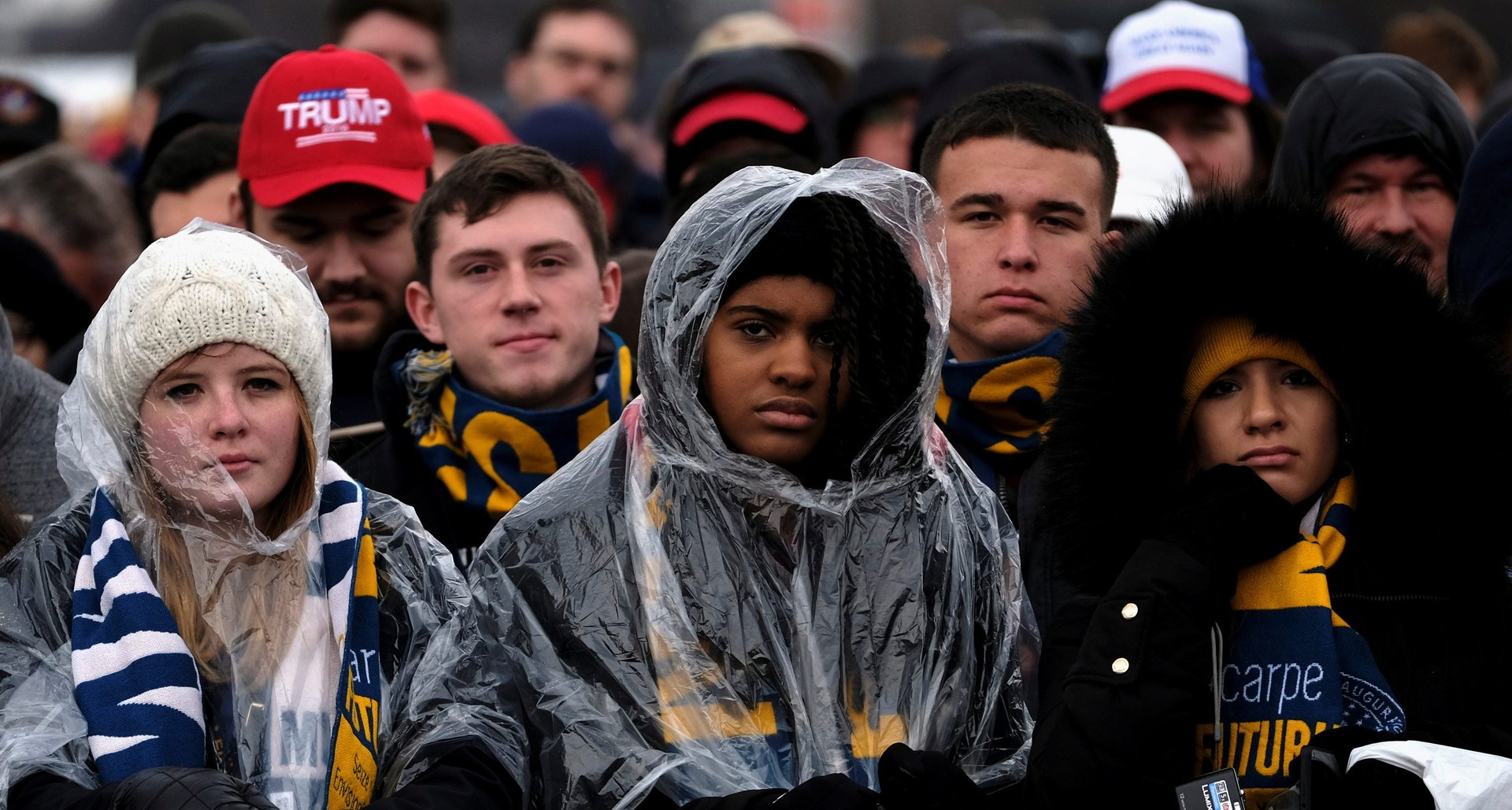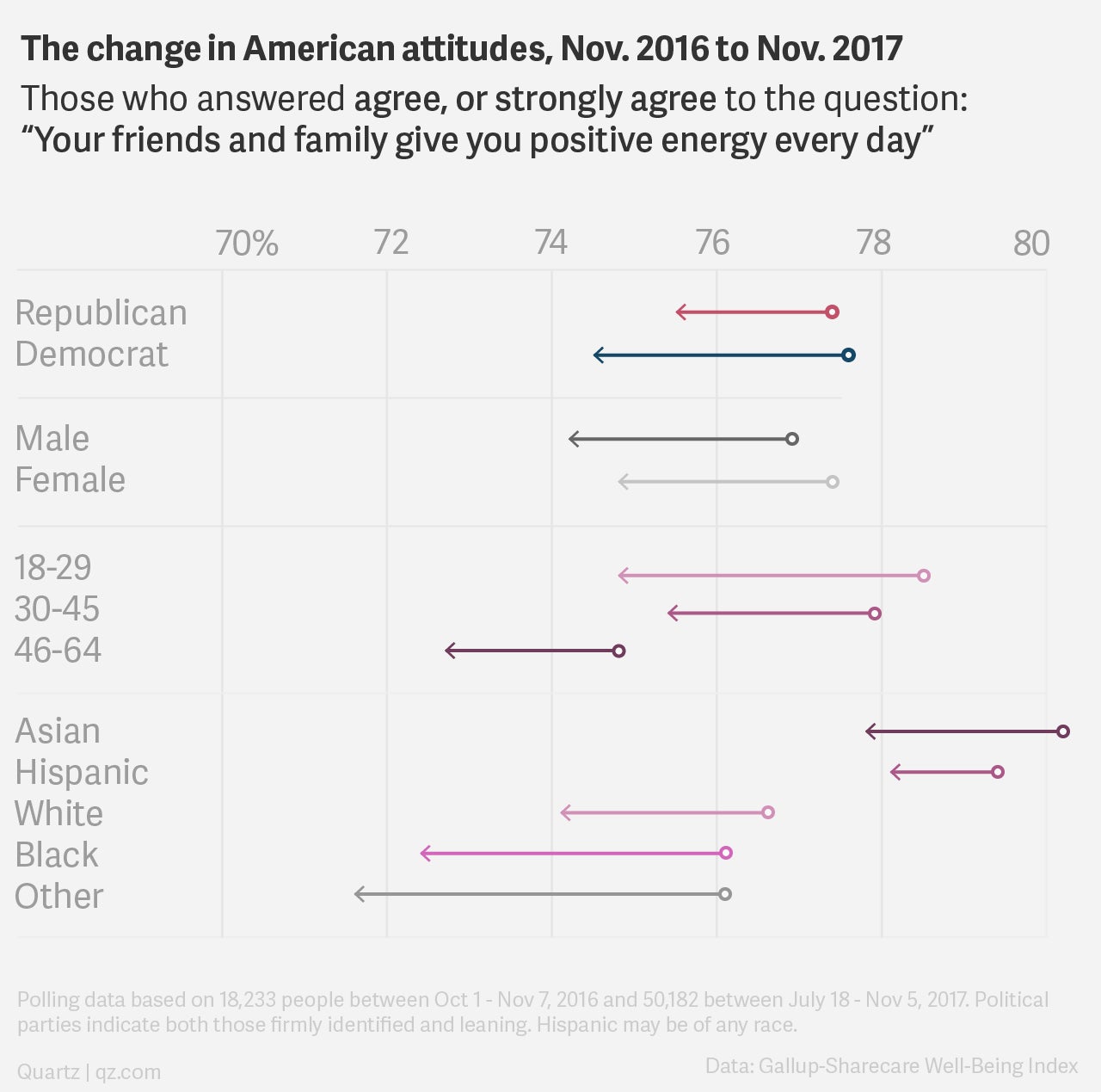It’s not just you: Americans are feeling utterly miserable
It has been exactly a year since the election of US president Donald Trump on Nov. 8, 2016, and graphs showing the level of positivity people get from their family friends reveal one very clear trend over the past 365 days: Down.


It has been exactly a year since the election of US president Donald Trump on Nov. 8, 2016, and graphs showing the level of positivity people get from their family friends reveal one very clear trend over the past 365 days: Down.
Regardless of demographics or politics, Americans have experienced a slump in positivity. Though there are differences of degree, people of all races, genders and party affiliations are getting less positivity from their family and friends today than they were a year ago, according to new data from the Gallup-Sharecare Well-Being Index.
Gallup-Sharecare asked whether “your friends and family give you positive energy every day,” and respondents rated their answer on a scale from 1 to 5, from strongly disagree to strongly agree.

Dan Witters, the Gallup-Sharecare Well-Being Index research director, says the decline shown in these graphs matches the wider mood in the US.
“Well-being has been slowly but steadily improving in recent years. It reached a high mark in 2016 and so 2017 has been characterized by a rather substantial drop,” he says.
How substantial? Witters has never seen such a large drop since Gallup-Sharecare began recording the national Well-Being Index in 2008. Because of methodological changes in how the survey was conducted, the score in 2017 cannot be directly compared to that in 2008. But the annual drop can be compared, and shows that the fall in the past year is significantly larger than previously recorded—three times larger than from 2008 to 2009, during the recession.
Witters believes that the Trump presidency, and fractured social relations as a result of his controversial policies, have played a “substantial role” in the drop in wellbeing.
“Whether you’re Republican or Democrat, there’s an increased probability you’ll be in relationships that are more contentious,” he says. “There’s going to be more arguing and more negativity than there used to be around the dinner table. That’s going to hold true regardless of whether you’re pro or anti Trump. But that swirling animosity, mixing it up at the dinner table, that’s real.”
Overall, 2017 has brought noticeable declines in emotional health, social wellbeing, and purpose. The decline in positivity from family and friends fits this picture: “The metric has to do with not just happiness but positive energy from people closest to you”
Lee Kravetz, psychotherapist and author of Strange Contagion, says that the universal drop in positivity makes sense, as emotions, thoughts, and behaviors are “highly contagious.”
As he’s written for Quartz, when one person is unhappy at a workplace, the malaise can infect the entire team. “If it can happen in small groups, it can absolutely happen in large groups on a macro level,” he says.
He notes that when individuals experience trauma, those close to them can experience “secondary trauma”: “When people are shocked or angered or hurt, even if we’re not personally affected, when we witness this, we can catch their traumas,” he says. “We’re surrounded by people right now who are affected by the policies that our current government is enacting, some of the more devastating legislative decisions. Absolutely we’re going to be experiencing vicarious trauma.”
There’s a positive flipside to the spread of negativity, though: “Resilience is very contagious, as is happiness and health,” says Kravetz. As the holiday season approaches, many have a sense of trepidation about potential conflicts. But those who feel a spark of happiness or excitement could ignite similar positivity in their friends and families.
Just as we can bring each other down, we can also lift each other back up.